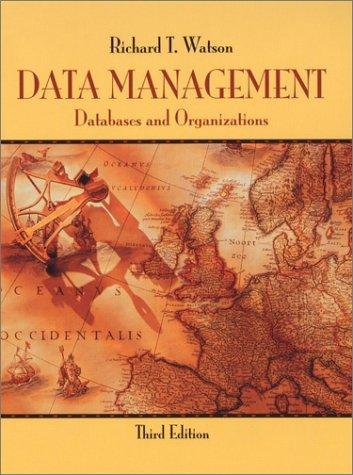Question
Social media and the Internet In 2009, Kevin Systrom, a 26-year-old marketing employee, spent his weekends and nights learning how to code. He wanted to
Social media and the Internet
In 2009, Kevin Systrom, a 26-year-old marketing employee, spent his weekends and nights learning how to code. He wanted to create an app that could combine elements of Foursquare check-ins with elements of Mafia Wars. He called it Burbn. In 2010 Systrom met software engineer Mike Krieger at a social function. Krieger liked the idea of Burbn. Together they spent a year developing and refining image processing codes and transforming Burbn into an app that would focus solely on communicating through images. They renamed the app and launched it as Instagram.
Since the turn of the millennium, computer scientists and engineers have revolutionized how we digitally engage with the world. Social media allows users to check in to locations, post pictures, hang out with friends, make plans and do much more. They facilitate the creation of communities, keep people informed and updated, share information and knowledge, and reach out to the size of an audience that would not be feasible face to face. In 2019, there were approximately 3 billion social media users and more than 5 billion active Internet users. Some scientists and engineers, however, are now expressing dissatisfaction with the way their well-intentioned inventions have led to controversial and unintended consequences.
Tristen Harris, a former Google ethicist, describes digital media as modern day hijackers that coerce us to make choices we are not even aware we are making. Justin Rosenstein, the creator of the Facebook Like button, foresees a dystopic future in which digital forces, if left unchecked, can render freedom of choice obsolete. Other techies in Silicon Valley echo Rosensteins view, claiming that digital and social media are distorting the ways we think, making us more impulsive and less rational. Indeed, political earthquakes like Brexit and Donald Trumps electoral victory have been attributed to fake news on Facebook, Russian-created Twitter bots and the datacentric targeting efforts of Cambridge Analytica. Apple, Facebook, Google, Twitter, Instagram and Snapchat are accused of having the means to control our minds.
Social media and the Internet have themselves been abused by users. Numerous murders, rapes, beheadings, shootings, physical attacks and other acts of violence have been live streamed to the world on Facebook, Twitch and other platforms. The head of Instagram, Adam Mosseri, believes its the responsibility of the app designer to predict ways in which a digital platform might be abused, and to identify and remove problems when they do occur. Technology creators need to think like criminals and build in precautionary measures he says.
Facebook has developed a machine learning system named Rosetta to recognize and stop hateful and inappropriate content. Rosetta extracts text from over a billion public Facebook images and video frames, daily and in real time, and inputs these into a text recognition model which has been trained on classifiers to understand both the text and the context of the image. The end-to-end detection system is trained by bootstrapping the model with an in-house synthetic data set, which is then fine tuned with human annotated data sets so that the model learns real-world characteristics.
Fredrick Brennan, the founder of 8chen, believes the role of technologists is not to police the Internet. 8chen is an unmoderated message board that provides complete anonymity to users who can post anything they want. Brennan argues that he created 8chen due to a loss of free speech and intensified surveillance on the Internet. Posts on the message board have included child pornography, white supremacy and racism, all of which have been tolerated by site administrators Brennan and more recently the new owner Jim Watkins in the name of freedom of speech. Watkins believes that 8chen is merely a tool for the expression of constitutionally protected hate speech.
Some governments have taken it on themselves to monitor exchange of ideas on online platforms by censoring and blocking social media and websites. Turkey has blocked over 100,000 websites, including Wikipedia. In Saudi Arabia, news websites linked to Iran are banned. In 2018, Egypt passed a law that allows the government the right to block social media users and accounts that it believes have an intent to break the law. The Australian, UK and American governments have sent an open letter to Mark Zuckerberg asking for back door access to all encrypted messages on all Facebook platforms. This came at a time when Facebook had announced it would initiate end-to-end encryption on all its applications. Journalists and human rights activists are concerned that this would give law enforcement and national security agencies in these countries access to every conversation held across every digital device.
The answer should be around 10 lines or so (200 words minimum).
Q1 ) What is/are the problem/problems here? Is there an underlying fundamental problem?
Q2) What are the major ethical, legal, and security aspects associated with the problem.
Step by Step Solution
There are 3 Steps involved in it
Step: 1

Get Instant Access to Expert-Tailored Solutions
See step-by-step solutions with expert insights and AI powered tools for academic success
Step: 2

Step: 3

Ace Your Homework with AI
Get the answers you need in no time with our AI-driven, step-by-step assistance
Get Started


